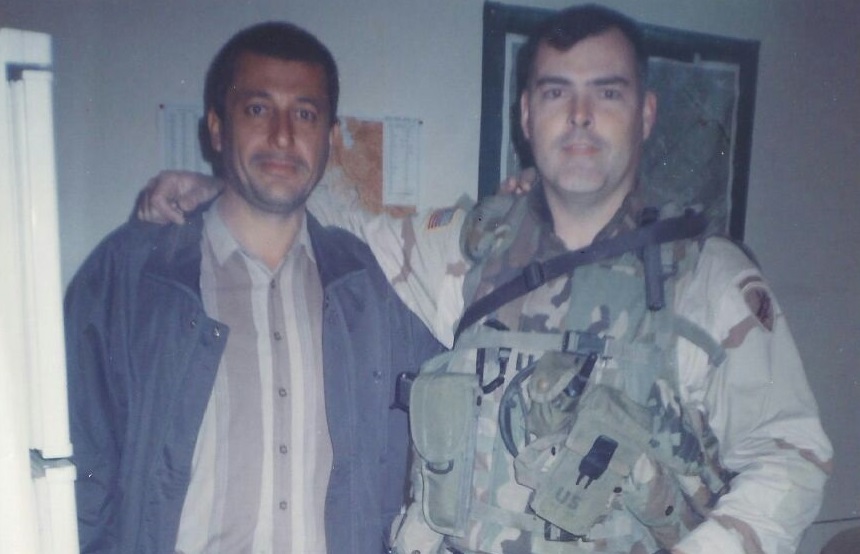Sam* is an Iraqi refugee who worked as an interpreter for the U.S. military in Iraq. He has been living in hiding in Egypt since 2014. Sam is a pseudonym to protect his identity, as he is at constant risk of being deported back to Iraq, where his life is in danger.
My name is Sam and I am an Iraqi refugee in Egypt. I have lived here for almost four years, separated from my family and without the ability to work or become a legal resident. But I live here to protect myself and my family. I have no other choice. Back home in Iraq, I am in danger. I am targeted because I worked with U.S. forces as an interpreter.
During my work with the United States in 2003 and 2004, I fought alongside U.S. soldiers. They became my brothers: they relied on me and I relied on them. I am proud to say that I helped save the lives of many of my American brothers, as they would have done for me. They trusted me, and I trusted them and that the American government would keep its word when they promised to protect me against those who want to hurt me for my work with American forces.
To my great sadness, that trust has been betrayed. While the veterans I worked with continue to fight for my safety, the government’s anti-refugee policies have left me stranded and in danger for my life.
I stopped my work with the U.S. after surviving my first assassination attempt. While walking home from the base after dark, a man shot at me, hitting me in the leg and permanently damaging my hearing. Unfortunately, attacks of this kind aren’t unusual and many interpreters who couldn’t get out of the country in time have been executed.
Then a grenade was thrown at my home and I decided it was time to move with my family to Baghdad. But still, I wasn’t safe. I tried to work with the U.S. again but three weeks into the job I noticed I was being followed. Then, in 2014, members of a local militia attacked me in my own home and demanded that I join them. I was worried they would hurt my family, so I agreed to give them information, just to make them leave. They took my ID and took photos of me and said they would be back. As soon as I could, I left and fled to Egypt.
I can’t go back to Iraq, because I am targeted by both Sunnis and Shiites. The Sunnis hate me because I worked with the U.S. government and the Shiites hunt me because I will not become an informant.
Here in Egypt, my situation is terrible. I could be deported back to Iraq any day and I cannot trust the government. Just the other day, I was stopped in the street by men who said they were police. They interrogated me, made me take them to my apartment, and took my phone and wallet. I knew they were gangsters, which is why I handed them everything. But now they know where I live and I am scared.
I applied for resettlement to the United States via a special program for Iraqis who helped the U.S. in Iraq. But three years and eight months later I am still here. The vetting process was long and complicated. I underwent several background checks by many agencies, and had commanding officers write me letters of recommendation.
One officer is prepared to provide me a home with his family in Dallas. Another is going to offer me a job in California. I know my brothers will take care of me, as I did for them. Of course, those officers care about the safety of Americans and I care about the safety of Americans, too. But even after all I have done, does America care about my safety and that of my family?
I had passed all the security checks and I had communities ready to welcome me, and last October I was finally told to get ready to travel. But my travel was canceled when the U.S. government decided to ban refugees from Iraq for at least ninety days and subject us to new restrictions whenever the ban was finally lifted. Now I am back in security checks.
When I heard I couldn’t come to the United States after all, I was devastated and humiliated. I feel like I am being treated like a child, or worse, a criminal. I was told that maybe after three months the ban would be over and my application would be ready for resettlement again. Then in January they called and asked me to provide my addresses going back 10 years and additional contact information for extended family members. I am disappointed that I am being treated as though I am dishonest. I feel like I have sacrificed a lot for the United States, but this process has me wondering whether my sacrifice was worth it. And I am not the only one who feels like America has broken its promise.
I urge the U.S. government to place the same trust in us that the soldiers had when their lives were on the line. Please don’t forget us. Our own lives depend on it.




Comments are closed.